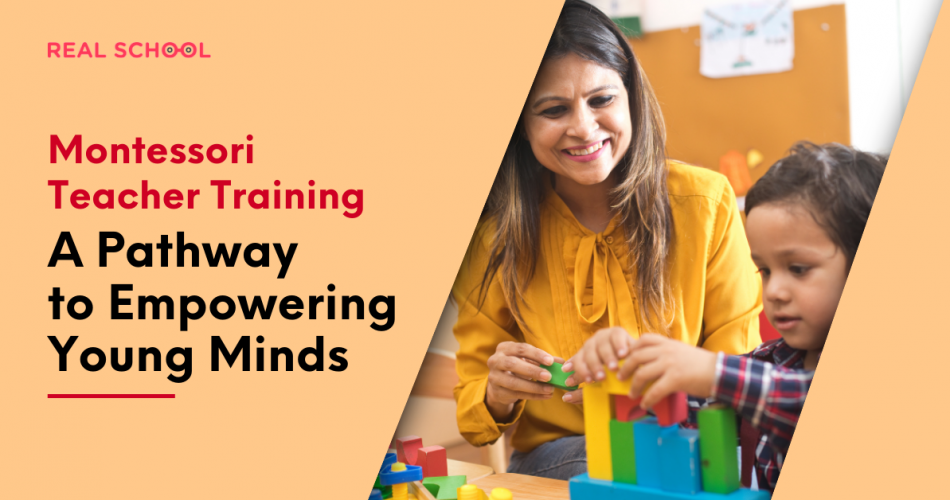Montessori education is renowned for its child-centered approach and emphasis on fostering independence and a love for learning in children. Behind the success of a Montessori classroom stands a skilled and dedicated Montessori teacher. Montessori teacher training plays a crucial role in equipping educators with the knowledge and expertise to empower young minds effectively. In this article, we will explore the significance of Montessori teacher training and the transformative impact it has on both teachers and their students.
Understanding the Montessori Philosophy
Montessori teacher training begins with a comprehensive understanding of the Montessori philosophy. Teachers learn about the principles and methods developed by Dr. Maria Montessori, including the role of the prepared environment, the importance of hands-on learning materials, and the value of respecting each child’s unique development.
Child Development and Psychology
A key aspect of Montessori teacher training involves studying child development and psychology. Teachers delve into the stages of child development and gain insights into how children learn and grow. Understanding children’s cognitive, social, emotional, and physical development informs the design of meaningful and age-appropriate learning experiences.
Preparing the Environment
Montessori classrooms are carefully prepared environments that cater to children’s developmental needs. During training, teachers learn how to create a conducive learning space that encourages exploration, independence, and self-discovery. They also discover how to curate learning materials that spark curiosity and support holistic development.
Observational Skills
Observation is a vital tool for Montessori teachers. Through training, educators learn how to keenly observe children at work and play, understanding their interests, strengths, and challenges. Observations inform lesson planning and allow teachers to tailor the learning experience to each child’s unique needs.
Facilitating Self-Directed Learning
Montessori teachers are facilitators of learning rather than lecturers. Training equips educators with techniques to foster self-directed learning, where children choose activities based on their interests and work at their own pace. Teachers support and guide children in their exploration, encouraging independence and critical thinking.
Hands-On Materials and Lessons
Montessori teacher training includes practical experience with the learning materials used in the classroom. Teachers learn how to present lessons effectively and facilitate learning experiences using the Montessori materials. They understand the purpose and sequence of each material, ensuring children receive a well-rounded and engaging education.
Nurturing Emotional Growth
Montessori education places equal emphasis on children’s emotional well-being. Teachers learn strategies to create a nurturing and supportive classroom culture, where children feel safe, valued, and respected. Emotional intelligence and social skills are fostered alongside academic growth.
Building Community and Parent Partnership
Montessori teachers learn the importance of building a strong sense of community within the classroom and the school. They also develop skills to collaborate effectively with parents, recognizing the value of a strong home-school partnership in supporting children’s overall development.
Continuing Professional Development
Montessori teacher training is not a one-time event; it is a lifelong journey of professional development. Montessori educators engage in ongoing learning, attending workshops, conferences, and networking with fellow educators. This commitment to growth ensures that teachers stay current with educational research and continue refining their teaching practices.
Empowering Young Minds
Ultimately, Montessori teacher training empowers educators to be advocates for children’s holistic development. Armed with a deep understanding of child psychology, a passion for education, and a commitment to the Montessori philosophy, teachers create learning environments that inspire and nurture young minds. By embracing the child-centered approach and valuing each child’s potential, Montessori teachers play a transformative role in shaping a generation of confident, curious, and lifelong learners.
Conclusion
Montessori teacher training is a pathway to empowering young minds and creating transformative educational experiences. Through a thorough understanding of the Montessori philosophy, child development principles, and the art of facilitating self-directed learning, teachers become skilled guides who inspire a love for learning in children. Montessori teacher training is not just about teaching; it is about empowering the future leaders, innovators, and thinkers who will shape our world with creativity, compassion, and a passion for lifelong learning.
FAQs (Frequently Asked Questions)
What are the different levels of Montessori teacher training available?
How long does Montessori teacher training typically take?
Is Montessori teacher training suitable for educators with diverse educational backgrounds?
What role does practical experience play in Montessori teacher training?
How can Montessori-trained teachers support children with diverse learning needs in the classroom?







